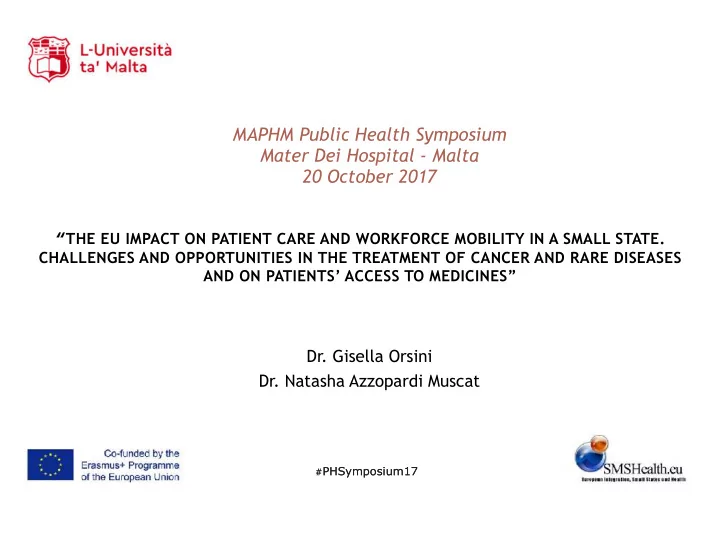

MAPHM Public Health Symposium Mater Dei Hospital - Malta 20 October 2017 “ THE EU IMPACT ON PATIENT CARE AND WORKFORCE MOBILITY IN A SMALL STATE. CHALLENGES AND OPPORTUNITIES IN THE TREATMENT OF CANCER AND RARE DISEASES AND ON PATIENTS’ ACCESS TO MEDICINES” Dr. Gisella Orsini Dr. Natasha Azzopardi Muscat # PHSymposium17 # PHSymposium17
SMSHealth.eu Project • 3 year project co-funded by the Erasmus + Programme (September 2015 / August 2018). • Project network: Malta, Estonia, Slovenia, Iceland and The Netherlands RESEARCH QUESTIONS (i) What are the challenges (or opportunities) experienced by health systems in small states? (ii) What are the characteristic features of health system reforms in small states? (iii) What role does the EU play in influencing small state health systems? Preliminary findings from the SMSHealth project - Malta Face-to-face semi-structured interviews with experts on medicines policy, health care workforce mobility, cancer, rare diseases (N=10) # PHSymposium17 # PHSymposium17
SMSHealth.eu Project # PHSymposium17 # PHSymposium17
Challenges • Access to medicines appears to be an issue of concern in Malta: small market/unattractive market, little negotiation power, limited purchasing power (cancer/rare diseases) • Health care workforce shortage , (especially nurses/highly specialised professionals) due to: (i) mismatch between demand and supply of labour (ii) limited economic resources (iii) absence of specialised training and courses • High dependence on small numbers of highly specialised health care professionals • Lack of highly specialised professionals (small population - low demand) • S ervice driven rather than research driven • Lack of resources (human and financial) — (rare diseases). • Patients who require highly specialised care are sent/treated overseas: small population/f ew cases # PHSymposium17 # PHSymposium17
Opportunities Small population - good opportunity Easier population health surveillance • • for research WE HAVE A LOT OF APPROACHES FROM INTERNATIONAL CONSORTIA NONE OF OUR PATIENTS ARE TO JOIN WITH THEM. OUR LOST TO FOLLOW UP, BECAUSE DATA QUALITY HAS A HIGH YOU CAN’T ESCAPE FROM THIS REPUTATION, AGAIN SIMPLY ISLAND. I MEAN, WE ARE ALL BECAUSE WE ARE A SMALL HERE. IN FACT, OUR FOLLOW UP COUNTRY AND IT’S VERY DIFFICULT NOT TO BE 100% IS USUALLY ABOVE 95%. COMPLETE. BECAUSE IT IS (MLT #05) EASIER TO CAPTURE THE CASES. (MLT #09) # PHSymposium17 # PHSymposium17
Opportunities Easier to lease between groups — to • Policy makers — “helicopter view” • address issues in health care - “one level of health issues bureaucracy” “SO WE END UP HAVING A BROAD VIEW, “LIAISONS BETWEEN WHICH IS A POSITIVE THING. AND USUALLY A BROADER VIEW THAN SOMEONE GROUPS IT’S EASY BECAUSE COMING FROM A BIGGER COUNTRY. IT’S CLOSE. THERE IS ONE BECAUSE WE ARE INVOLVED IN MANY LEVEL OF BUREAUCRACY. THINGS; WE DON’T JUST SPECIALISE IN ONE PARTICULAR THING. SOMETIMES WE OVER HERE, IT IS JUST ONE CAN SEE THINGS THAT OTHER COUNTRIES LEVEL, YOU GET THROUGH DON’T SEE. I THINK THIS IS ONE OF OUR MAJOR CONTRIBUTIONS. IT’S A POSITIVE THAT, AND ALL IS DONE. SO THING THAT YOU HAVE A BROAD VIEW, THAT IS AN ADVANTAGE. THAT YOU ARE INVOLVED IN MANY (MLT #05) THINGS.” (MLT #06) # PHSymposium17 # PHSymposium17
The influence/role of the EU The EU can enhance cooperation among member states, networking, sharing of data • The EU facilitates Health care workforce mobility (exchange of knowledge/employment of foreign professionals) • The EU has positively impacted the educational system • • EU funds (ERDF , EU funded projects) essential for improving health care services (e.g: new Oncology Hospital - Sir Anthony Mamo Oncology Centre, opened in 2014; setting up of the Maltese Biobank ). • The EU is perceived positively: (i) drive for change (e.g: implementation of colorectal and cervical screening programs) (ii) provides guidelines (iii) enhances quality # PHSymposium17 # PHSymposium17
Conclusions positive impact from the EU on the domestic health system: • (i) the use of EU funds allowed important health services improvements, which would have not been • possible due to the limited economic resources (ii) N etworking and cooperation at EU level ( rare diseases, cancer and health workforce mobility) • (iii) the EU has served as important driver of change (also thanks to its technical guidance) . • Access to medicines — negatively impacted by the EU legal framework — more pronounced in • relation to orphan drugs, and therefore in relation to rare diseases The EU needs to acknowledge small states’ features and challenges, by moving away from “one • size fits all” approach. # PHSymposium17 # PHSymposium17
Conclusions Despite the limitations of being a small country (small population, small market, limited economic and human resources), the Maltese health system appears to adequately respond the populations’ needs and expectations. “small states can succeed in having a strong public health system in spite of the disadvantages associated with small size, if these states adopt policies leading to good governance” (Briguglio & Azzopardi-Muscat, 2015) # PHSymposium17 # PHSymposium17
THANK YOU! https://www.smshealth.nl # PHSymposium17 # PHSymposium17
Recommend
More recommend